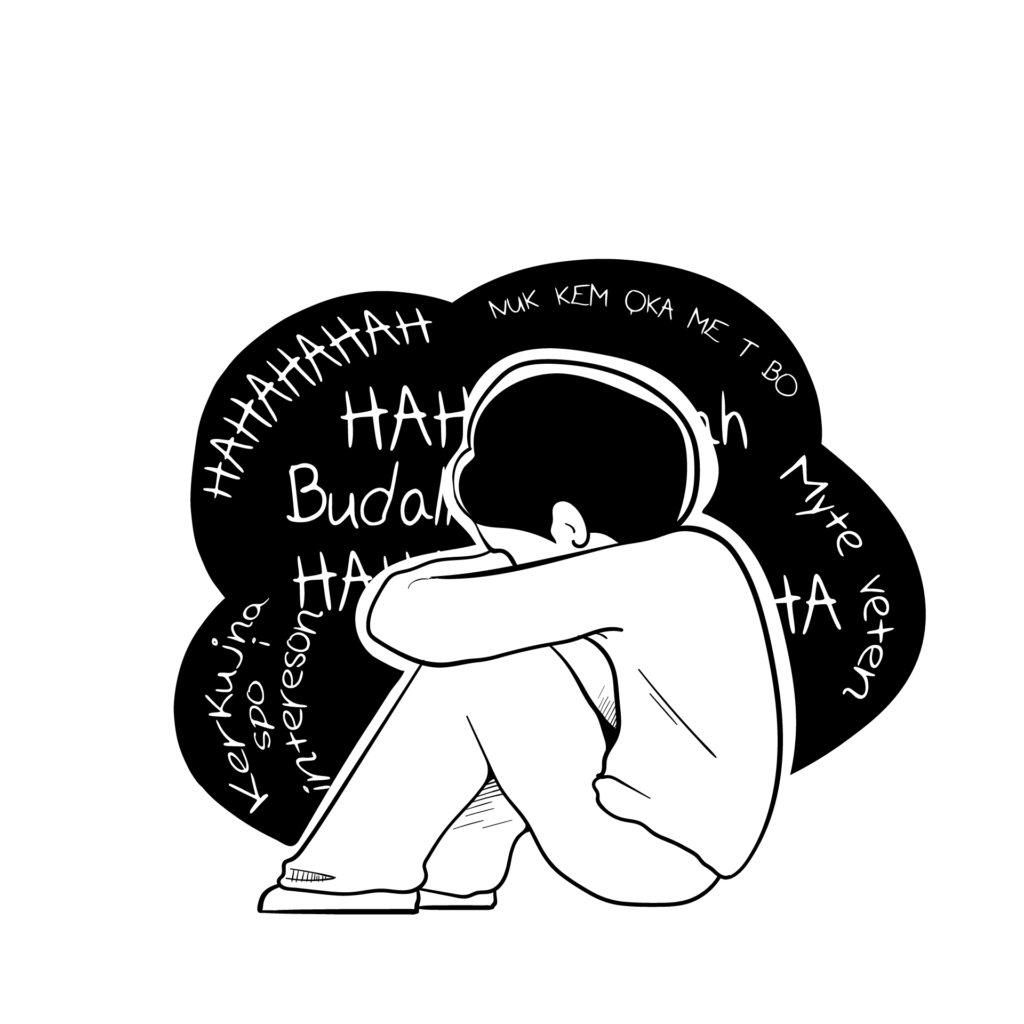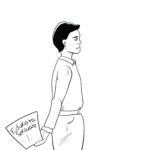THE IMPACT OF BULLYING ON YOUTH WELLBEING
This phenomena’s consequences are various. When a student falls prey to bullying, he/she will constantly be under the influence of stress, depression, isolation and can even bring about more severe forms of self-harm. But students can be impacted in other ways such as loss of confidence and unsatisfactory school results, and if it is overbearing the bullied student may even ask to change schools. And we face such a problem in Kosovo, especially in primary schools or high schools, where bullying between students is almost inevitable.
Illustration: Argjira Kukaj

By bullying we understand cases in which a student in a constant way faces outside harassment from a student or group of students that are considered “stronger”, a phenomenon that causes injuries in the physical and also psychological aspect.
Different forms of bullying exist, such as verbal bullying, physical or emotional or even harassment in electronic form, called “cyber-bullying”. However, at the same time bullying can happen in other places outside school but can continue in school, and vice versa.
This phenomena’s consequences are various. When a student falls prey to bullying, he/she will constantly be under the influence of stress, depression, isolation and can even bring about more severe forms of self-harm. But students can be impacted in other ways such as loss of confidence and unsatisfactory school results, and if it is overbearing the bullied student may even ask to change schools. And we face such a problem in Kosovo, especially in primary schools or high schools, where bullying between students is almost inevitable.
For S.Q, now a journalism student at the University of Prishtina, school bullying, mainly verbal harassment has always been present and has very negatively impacted her by making her feel left out or even as an unwanted part of that circle.
And in relation to the possibility of reporting these cases of bullying, she says that she hasn’t had where to direct her complaints in school.
“At school, bullying was considered bullying only when there were large consequences and large groups of people involved and not only individuals. So, bullying that caused a physical altercation or sometimes even more. But to ask for help from the school for verbal harassment was impossible, and almost even absurd for them”, she says.
Some HBSC (Health Behaviour in School-aged Children) statistics in Kosovo from 2014 show that in Kosovo schools students get bullied or bully others often.
For the most part of the students, this has happened 2-3 times during this year (19.2% were bullied and 15.9% have bullied others) and 5% of them have experienced bullying two or more times during a month.
“Based on the data found it is shown that girls are less bullied and consequently bully others less in comparison to boys, thus showing that students that were bullied, are more likely to bully others. Nevertheless, bullying consequences have been very serious starting from the fact that respondents have shown dissatisfaction in school and life in general, sleeping problems and have also reported as having had less time to spend with friends. When they were asked to talk about the bullying, around 80% of children aged 6-10 said that they mostly talk to their parents, and those of ages 11-18 said that they speak to anyone about the bullying (family, friends, school staff, police etc) ”, says this report.
Whereas, on the emergence of this issue the lack of psychologists in schools can also have an impact seeing as only 80 psychologists and pedagogues are employed in more than 700 educational institutions in the primary and lower and higher secondary level, which has a direct impact on bullying perception and the confronting method from the side of the bullied.
Valdet Plakolli, psychologist, thinks that bullying is widespread in every society, and our schools are not an exception, but according to him there is a lack in statistics, expect some that were published by social sciences students and professors.
In relation to the importance of school psychologists and future treatment of bullying, Plakolli said that they should be present in every school.
“I don’t think that bullying can be eliminated, but the presence of a psychologist and other professionals in schools helps a lot in lowering and successfully treating cases, improving social relations in schools, improving communication, raising confidence in students and also reporting and successfully treating these cases”, he says.
And this whole problem can be treated if also the right moral, institutional support and awareness of students exists regarding this phenomena’s consequences and effects on our society. Taking concrete steps such as awareness raising lectures, trainings that have a focus on this issue and also cooperation between parents and teachers that has a positive impact in bullying reduction even more, until all students are free to express what they think freely, without fear that someone will bully them.
About the author: Rexhep Kameraj is an 18 year old boy from Deçan who attends university studies in the Faculty of Philology in the English Language Department.
This activity is supported by Engagement for Equity Program – E4E, financed by United States Agency for International Development – USAID, and implemented by Advocacy Training and
Resource Center –ATRC.


